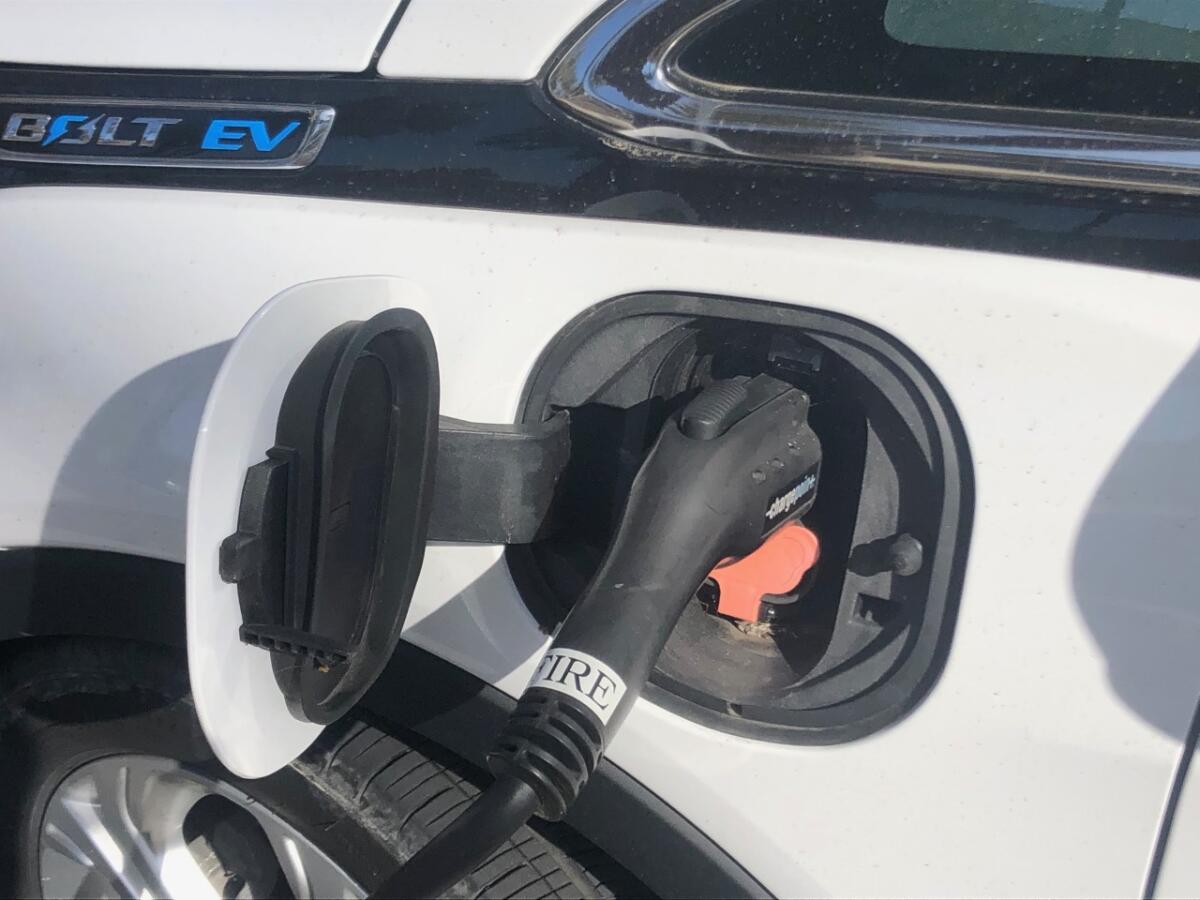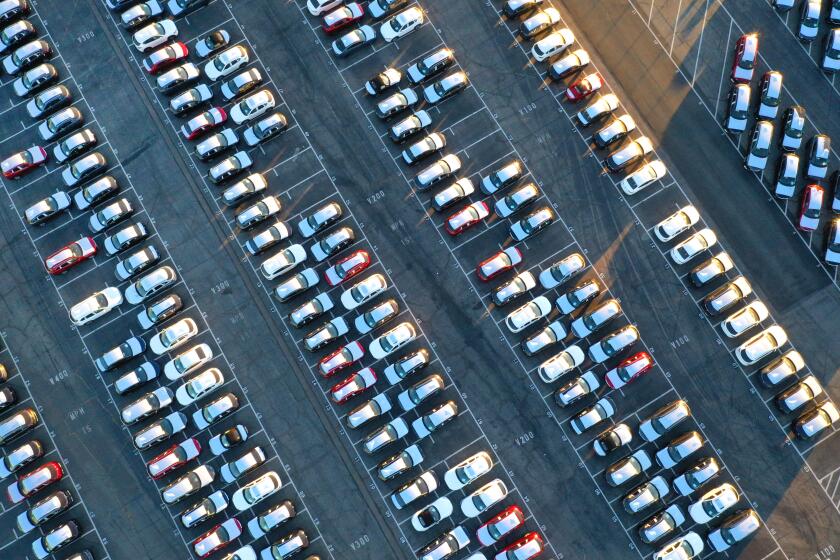Plan to extract lithium from Xinjiang raises forced-labor questions for EV industry

- Share via
A lithium producer for carmakers including BMW and Tesla Inc. is beginning work to assess battery metals projects in Xinjiang, deepening links between electric vehicle supply chains and a region at the heart of human-rights allegations against China.
Ganfeng Lithium Co., China’s top producer of the material, is partnering through a subsidiary with a state-backed entity to accelerate exploration for and potentially develop lithium, nickel and other crucial metal assets in the region. Ganfeng Chairman Li Liangbin earlier this year visited Xinjiang — where activists and Western governments say Uyghurs and other Muslim citizens have been subjected to forced labor — to discuss cooperating with the local government on the plans.
Electric-vehicle makers already face criticism over labor concerns and environmental damage tied to the extraction of metals used in their products. The deepening connection between Ganfeng and Xinjiang is set to draw more scrutiny from investors and consumers. Ganfeng said in November that it had won a new three-year deal to provide battery-grade lithium hydroxide products to Tesla, and has previously disclosed other contracts with companies including BMW.
Xinyu, China-based Ganfeng prioritizes “the importance of environmental protection, social responsibility and corporate governance,” which includes defending employee rights, the company said in a statement.
In Xinjiang, “the resource is at an early stage of exploration and it’s currently uncertain whether there’s suitable projects available for future development,” Ganfeng said. The company pursues a strategy of having projects in multiple countries to help limit theeffect of extracting lithium excessively in any single location, it said.
Representatives for Tesla in China declined to comment. Ganfeng supplies BMW with lithium from mines in Australia and hasn’t informed the company about its Xinjiang venture, the German automaker said in a statement.
In the name of climate action, California pushed the world toward electric cars. But building enough of them is creating its own environmental crises.
The U.S. and its allies have sanctioned individuals and entities with ties to Xinjiang and curbed some imports from the region over concerns about human rights breaches and the alleged use of forced labor. China has repeatedly denied the accusations, with Foreign Ministry spokesman Zhao Lijian previously describing the accusations as “the lie of the century.”
Ties to Xinjiang-exposed suppliers are becoming more problematic for a swathe of industries. The Uyghur Forced Labor Prevention Act, which came into force in the U.S. in June, will block imports unless companies can prove they weren’t made with forced labor. Already, some solar products have been halted over questions about the source of their raw materials.
Ganfeng’s plans to expand in Xinjiang risk drawing Tesla closer to the controversy over human rights in the region. They also threaten to complicate its strategy in China, where a Shanghai factory manufactures vehicles for the world’s top EV market and also for export to Europe and elsewhere in Asia.
The automaker in a May report disclosed a list of 12 mining and refining companies that are direct suppliers, with Ganfeng included among four lithium producers. Tesla, which has invested heavily in the Chinese market and previously opened a showroom in Xinjiang, said in the report that it found no instances of child labor, forced labor or inhumane treatment in audits of its suppliers.
Tesla will act to end relationships with suppliers that don’t meet standards, or fail to correct issues of concern in a reasonable time frame, according to the report.
“The risks to the EV sector of inputs coming out of Xinjiang is huge,” said Emily de La Bruyere, a co-founder of Horizon Advisory, a U.S.-based consulting firm focused on forced-labor issues. “It places all of China’s battery production at risk of violating U.S. law and global norms around human rights, and that risk is only going to grow as China continues to build up EV-relevant industries in Xinjiang.”
A joint venture between a Ganfeng unit and Xinjiang Geology and Mineral Investment (Group) Co. aims to obtain quality lithium resources, Ganfeng said in a post on an online investor forum in June. The new company was registered in May in the region’s capital Urumqi with capital of about 90 million yuan ($13.3 million). The partners will aim to take advantage of local lithium resources and contribute to the region’s economic development, according to a statement posted to WeChat.
The new firm is 49% owned by Ganfeng Zhongkai Mining Technology — itself a joint venture between Ganfeng Lithium and Jiangsu Nonghua Intelligent Agriculture Technology Co. — with state-backed Xinjiang Geology and Mineral Investment holding the remainder, according to China’s National Enterprise Credit Informational Publicity System.
Despite high gas prices, a vehicle shortage is putting the brakes on what should be an EV boom and pushing buyers to search for workarounds.
Companies have found themselves caught between the U.S. and China over the issue of Xinjiang. Activists and Western associations have urged them to cut ties completely, but any moves to distance themselves from the region risk drawing the ire of the Chinese government. Tesla’s announcement that it was opening a showroom there drew criticism from groups including the Alliance for American Manufacturing.
Volkswagen has also faced pressure over a production facility in Urumqi, prompting Chief Executive Herbert Diess to argue that the automaker’s presence in Xinjiang can be a force for good. Although VW and Ganfeng announced plans in 2019 for a 10-year supply pact, the companies currently have “no direct business relationship,” the carmaker said in a statement.
In theory, Tesla and other automakers could find a way to keep their relationships with Ganfeng going while avoiding any metals that come from Xinjiang.
Ganfeng has a vast network of operations and projects spanning Australia to Argentina, which could give clients options to avoid the use of raw materials produced from future Xinjiang sites, said Seth Goldstein, a Chicago-based equity strategist at Morningstar Research Services who covers Tesla and battery supply-chain firms. “The customer could likely request to buy lithium from Ganfeng’s other operations,” he said. “With regards to Tesla, I don’t foresee any problems.”
But separating the materials might not be that straightforward for all consumers, given the complexity of EV supply chains that involve multiple stages of mining, refining, component manufacturing and assembly — typically spread across multiple locations — and the dangers of that obscuring the original source of raw materials.
“Any indication that Tesla, or another EV or battery manufacturer, is in fact collaborating with businesses that seem plausibly to be using forced labor would be very concerning to investors,” said Richard Clayton, research director at SOC Investment Group, which works with union pension funds that manage assets worth more than $250 billion and hold Tesla shares.
Companies in the sector face “significant reputational, regulatory, and potentially legal risks stemming from the environmental and human rights practices” associated with battery metals mining, he said.
Owners of electric vehicles are making a quick buck by selling the cars they waited months to get, taking advantage of strong demand and tight supply. And not just Teslas.
— With assistance from Bloomberg wrtiters Monica Raymunt and Wilfried Eckl-Dorna.
More to Read
Inside the business of entertainment
The Wide Shot brings you news, analysis and insights on everything from streaming wars to production — and what it all means for the future.
You may occasionally receive promotional content from the Los Angeles Times.













